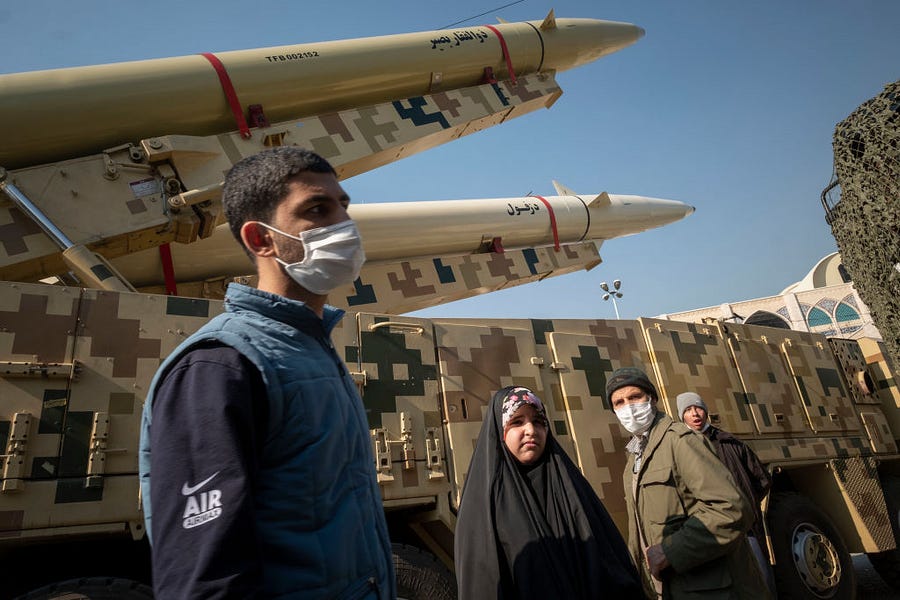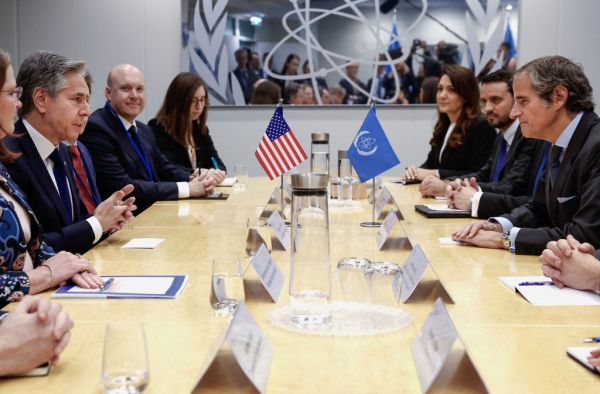The Biden administration is nearing a deal with Iran that it hopes could put the Islamic Republic’s nuclear program “back in a box.” The problem? The agreement—which aims to restore the 2015 accord called the Joint Comprehensive Plan of Action (JCPOA)—would also relax restrictions on ballistic missiles, a weapon the U.S. intelligence community assessed only months after the JCPOA was implemented as Iran’s “preferred method of delivering nuclear weapons, if it builds them.”
For more than a decade, the U.S. intelligence community has continuously affirmed that Iran’s ballistic missile arsenal is the biggest in the Middle East. Iran uses these missiles to intimidate and punish its adversaries while deterring a military reprisal. In a December 2021 interview, U.S. CENTCOM Commander Gen. Kenneth McKenzie identified Iran’s missiles as “a more immediate threat than its nuclear program.” Iranian officials have worked assiduously to make that the case, enhancing the range, accuracy, and mobility of their missiles, while also proliferating whole systems and components parts to their proxies to use in attacks on U.S. partners. Any deal predicated on the JCPOA—or its accompanying U.N. Security Council Resolution (UNSCR) 2231—that removes restrictions on Iran’s ballistic missile program, provides sanctions relief to its supporters, and ignores recent and groundbreaking Iranian ballistic missile developments would be a strategic mistake.
According to Annex B of UNSCR 2231, international prohibitions against Iranian ballistic missile tests and related activities will lapse in October 2023. In 2015 when the JCPOA was reached, this was sold as an eight-year moratorium. Unless amended, in 2022 however, the ban will be in place for only little longer than one year. While Iran has never respected this injunction—launching a combination of at least 27 surface-to-surface missiles (SSMs) and space-launch vehicles (SLVs) while the U.S. was a party to the deal—the prohibition is the result of several last minute Iranian negotiating victories from 2015.
UNSCR 2231 amends an older and more stringent resolution containing a permanent ban on Iranian ballistic missile tests. The new injunction against missile testing lapsing in 2023 is but one of several phased prohibitions popularly termed “sunsets.” Iran, likely assisted by its Russian and Chinese lawyers in the P5+1 negotiating mechanism, successfully replicated and pushed for the sunset-driven model to be applied other areas as well, be it lapsing restrictions on its nuclear program found in the JCPOA or the now terminated prohibition against conventional arms transfers from UNSCR 2231.
Making matters worse, the circumscribed missile prohibition was also caveated. Employing deferential language, UNSCR 2231 “calls upon Iran” not to partake in activities related to ballistic missiles that were “designed to be capable of delivering nuclear weapons.” And in addition to begetting overly technical debates pertaining to intention and design for known Iranian ballistic missile types, the distinction further redounded to Iran’s favor by ignoring that we still do not know everything about Iran’s past weaponization and miniaturization efforts, and that more broadly, ballistic missiles could be used to deliver other forms of WMD, such as chemical weapons. As a reminder, in 2016 the U.S. intelligence community seemingly left room for such an interpretation of Iran’s missile force when it judged that, “Iran’s ballistic missiles are inherently capable of delivering WMD.” The Islamic Republic has previously developed, employed, and even transferred chemical weapons.
Also in negotiations leading to the 2015 JCPOA, Tehran and its advocates further stymied efforts by Washington to make a case against Iranian violations by terminating an impartial “panel of experts” that previously investigated claims of violations pursuant to a mandate from older Iran-related resolutions. The Trump administration tried but failed to resurrect this panel in 2020. Instead of a panel, UNSCR 2231 requires only reports of alleged violations on a biannual basis.
Beyond the problem of lawyerly language and deference to Iran in UNSCR 2231 is a larger challenge created by EU and U.S. sanctions relief under the auspices of the JCPOA. According to the accord’s previous sanctions annex, the EU (as well as the U.K., given its autonomous post-Brexit Iran sanctions regime) is on track to remove from sanctions lists a broad swath of Iranian defense firms supportive of the regime’s ballistic missile program in October 2023. These are entities inclusive of, and tied to, the sanctioned Ministry of Defense and Armed Forces Logistics (MODAFL), it’s various front companies and subsidiaries that aid specific parts of the ballistic missile program such as development of liquid- and solid-propellant systems, as well the sanctioned Islamic Revolutionary Guard Corps (IRGC) and its missile branch, the IRGC Aerospace Force (IRGC-AF).
Retaining this schedule for delisting, which again was subject to an eight-year timeline in 2015 but now will be removed in just over a year, would make transatlantic coordination against Iran’s ballistic missile program more difficult. This raises questions as to how an already sanctions-skeptic and risk-averse administration might punish Iranian procurement nodes operating on the soil of an American ally. Lest the administration forget, then-candidate Biden pledged in an op-ed in 2020 to continue pressuring Iran’s ballistic missile program through targeted non-nuclear sanctions.
But based on what has been reported several times in 2021, non-nuclear sanctions relief undoing penalties imposed on Iran during the Trump administration is very much on the table, raising wider concerns about the dividends an agreement could provide Tehran. U.S. officials may have hinted at their willingness to offer such relief last year when they spoke of their preparedness to lift all sanctions deemed “inconsistent” with the JCPOA.
Accordingly, under the auspices of JCPOA reentry, the Biden administration might directly or indirectly remove sanctions on Iran’s missile program and its supporters, certain sectors of Iran’s economy aiding the missile program, as well as enable Iran access to frozen funds. Any or all of these moves will put Tehran’s ballistic missile and military technology procurement, production, and proliferation networks on steroids. Seemingly getting ready to compound the infusion of cash headed its way, the Iranian Parliament has already called for an allocation of 4.5 million euros from National Iranian Oil Company revenues to go toward the country’s defense capabilities.
This brings us to the final leg of the troika as to why a deal predicated on the JCPOA or UNSCR 2231 is a strategic mistake: ongoing Iranian ballistic missile advances. Iranian officials have never been shy about claiming that their missile program is non-negotiable. Nor have they been shy about touting their missile prowess and advances.
Brig. Gen. Amir-Ali Hajizadeh, who leads the Islamic Revolutionary Guard Corps Aerospace Force recently exclaimed that, “The firepower and simultaneous launches of our missiles have increased 6 to 7 fold, and the preparation time and preparation intervals for launches have been greatly reduced.” Reducing sanctions pressure and making revenues more available for a program that has been able to advance while under pressure would embolden rather than placate the Islamic Republic. This can make a regional military conflict involving ballistic missiles more likely in the short-to-medium term given Iranian confidence in their systems. It can even expedite the ongoing evolution in Iran’s security strategy from deterrent and defensive to offensive and coercive.
This is not theoretical. As Tehran’s ballistic missile aptitudes evolved in the post-JCPOA era, so did its risk tolerance. Iran resumed ballistic missile operations from its own territory against foreign targets, engaging in four publicized operations between 2017 and 2020. Throughout 2021 and into 2022, despite indirect nuclear diplomacy taking place between Iran and the U.S., Iran continued to carry out military drills featuring short-range ballistic missiles (SRBMs, which can travel up to 1,000 kilometers) and medium-range ballistic missiles (MRBMs, which can travel between 1,000 – 3,0000 kilometers), launching a reported 16 missiles during a drill conducted by the IRGC in late December, as well as to parading and releasing new systems.
This February, Iran unveiled and tested the latest upgrade to its domestically produced line of solid-propellant surface-to-surface missiles originating from the Fateh ballistic missile. Dubbed the “Kheybar Shekan,” or “Breaker of Kheybar,” the missile’s moniker memorializes an early Islamic military campaign against Jewish tribes in Arabia. The name is no accident, as the Islamic Republic is no stranger to courting antisemitism with its missile launches. The missile’s reported range of 1,450 kilometers establishes it as the third solid-propellant MRBM in Tehran’s arsenal. Solid-propellant systems are prized for their mobility and the speed with which they can be prepped prior to launch. Such systems have featured prominently in the four aforementioned Iranian military operations from 2017-2020.
Notably, the regime also did not curb, but rather sped up, its space-launch vehicle flight-tests, which offer a way to get around a self-imposed ballistic missile range cap of 2,000 kilometers and keep a pathway open for an intercontinental ballistic missile (ICBM) capability. Given that space-launch vehicles and ICBMs use similar technologies, an SLV program can inform an ICBM pathway through testing and studies of engines, staging, and more. In 2019, then IRGC Deputy Commander Brig. Gen. Hossein Salami framed the ban as being purely political, claiming, “We have no technical limitations in increasing [missile] range, accuracy of missiles at long ranges, destructive power, and strong propulsive forces.” Salami then issued a threat, “If based on a conspiracy, today the Europeans or others want to pursue the missile disarmament of the Islamic Republic of Iran, we will be forced to make a strategic leap.”
Previously, the U.S. intelligence community judged that, “Iran’s progress on space launch vehicles—along with its desire to deter the United States and its allies—provides Tehran with the means and motivation to develop longer-range missiles, including ICBMs.” This has remained a near consistent assessment in U.S. government reporting on Iran, whether it be from the Defense Intelligence Agency (DIA), multiple other Worldwide Threat Assessments by the director of national intelligence (DNI), and the National Air and Space Intelligence Committee (NASIC).
As I have previously assessed, datapoints from Iran’s progress on solid-propellants and increased SLV testing also supports the conclusion that Iran is working toward a full solid-propellant SLV, which would be a game-changer and in turn the clearest indication of its long-range strike capabilities evolving toward a potential ICBM capability. Iran has produced at least two solid-propellant motors, the smaller Salman motor in 2020, and larger Rafee motor in 2022, for its SLVs. It also already has two SLVs—the Qased and the Zuljanah—employing at least one solid-propellant motor in one of its stages. Both the Salman and the Rafee have thrust-vectoring capabilities and share other similarities. And just last month, a hardline Iranian newspaper heralded the Rafee as bringing ICBM-class missiles “more within range than ever” for Iran.
But Iran need not rush to an ICBM tomorrow to keep closing the gap between medium-range missiles and what it’s space-launch vehicles might be able to offer in terms of range. Iran has reportedly worked on improving the Khorramshahr ballistic missile, whose range Iran has grown through warhead modifications. Initially billed as an MRBM by Iranian sources, the Khorramshahr is based on a liquid-propellant nuclear-capable intermediate-range ballistic missile (IRBM, which can travel between 3,000 to 5,000 kilometers) that Iran received from North Korea in the early 2000s. According to European reports to the U.N. in 2019, Iran’s new Khorramshahr variant is now essentially an IRBM. U.N. reports have also assessed that Iran and North Korea “resumed cooperation on long-range missile development projects” in 2020.
The U.S. and Europe ignore these developments at their own peril. An Iranian IRBM and potentially ICBM capability is coming, and perhaps sooner than one might think. In the face of such a possibility, the worst thing Washington might do is ink an agreement like the JCPOA that offers sanctions relief to Iran’s missile underwriters, ignores the evolution in Iran’s ballistic missile forces, and waters down U.N. restrictions all while failing to block a pathway toward an ICBM capability. Borrowing from the famed French diplomat Talleyrand, inking such an agreement as a stand in for counterproliferation policy on Iran would be “worse than a crime.” It would be “a mistake.”
Behnam Ben Taleblu is a senior fellow at the Foundation for Defense of Democracies, where he focuses on Iranian political and security issues and contributes to its Center on Military and Political Power.








Please note that we at The Dispatch hold ourselves, our work, and our commenters to a higher standard than other places on the internet. We welcome comments that foster genuine debate or discussion—including comments critical of us or our work—but responses that include ad hominem attacks on fellow Dispatch members or are intended to stoke fear and anger may be moderated.